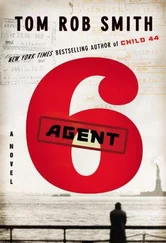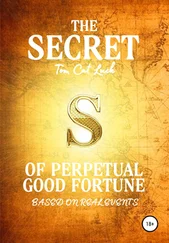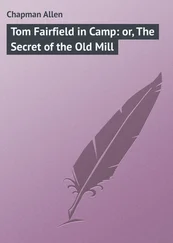Tom Smith - The Secret Speech
Здесь есть возможность читать онлайн «Tom Smith - The Secret Speech» весь текст электронной книги совершенно бесплатно (целиком полную версию без сокращений). В некоторых случаях можно слушать аудио, скачать через торрент в формате fb2 и присутствует краткое содержание. Жанр: Триллер, на английском языке. Описание произведения, (предисловие) а так же отзывы посетителей доступны на портале библиотеки ЛибКат.
- Название:The Secret Speech
- Автор:
- Жанр:
- Год:неизвестен
- ISBN:нет данных
- Рейтинг книги:5 / 5. Голосов: 1
-
Избранное:Добавить в избранное
- Отзывы:
-
Ваша оценка:
- 100
- 1
- 2
- 3
- 4
- 5
The Secret Speech: краткое содержание, описание и аннотация
Предлагаем к чтению аннотацию, описание, краткое содержание или предисловие (зависит от того, что написал сам автор книги «The Secret Speech»). Если вы не нашли необходимую информацию о книге — напишите в комментариях, мы постараемся отыскать её.
The Secret Speech — читать онлайн бесплатно полную книгу (весь текст) целиком
Ниже представлен текст книги, разбитый по страницам. Система сохранения места последней прочитанной страницы, позволяет с удобством читать онлайн бесплатно книгу «The Secret Speech», без необходимости каждый раз заново искать на чём Вы остановились. Поставьте закладку, и сможете в любой момент перейти на страницу, на которой закончили чтение.
Интервал:
Закладка:
Judging from the reindeer-coat vory ’s muted reaction, much of the looting had already been done. The most precious resources were already in his group’s hands.
The square-jawed worker, whose name Leo didn’t know, agreed to take some of the steps proposed, practical measures, as long as they dealt with the pressing matter of punishments for the captured guards:
— My men must have justice! They have waited years! They have suffered! They cannot wait a moment longer!
He spoke in slogans, every sentence ending in an exclamation mark. Though Lazar was reluctant to postpone the practical measures, he compromised in order to win support. The guards were to be placed on trial. Leo was to be placed on trial.
ONE OF LAZAR’S FOLLOWERS had once been a lawyer, in his former life, as he referred to it, and took a prominent role in setting up the tribunal by which Leo and the others were to be judged. He devised his system with relish. After years of submissive groveling, the lawyer delighted in returning to a tone of authority and expertise, a tone that he considered naturally his:
— We agree that only the guards will be tried. The medical staff and the former prisoners who now work for the Gulag administration are exempt.
This proposal was agreed. The lawyer continued:
— The steps to the commander’s office will serve as the court’s stage. The guard will be led to the bottom step. We, the free men, will call out examples of their brutality. If an incident is considered valid the guard will take a step up. If the guard reaches the top they will be executed. If they do not, even if they reach the penultimate step and no more crimes can be found against them, the guard will be allowed to descend the stairs and sit down.
Leo counted the steps. There were thirteen in total. Since they started on the bottom step, that meant twelve crimes to reach the top: twelve to die, eleven or less to live.
Dropping his voice, striking a note of deliberate gravitas, the lawyer called out:
— Commander Zhores Sinyavksy.
Led to the first step, Sinyavksy faced his court. His shoulder had been crudely bandaged, the bleeding stopped in order to keep him alive long enough that he might face justice. His arm hung uselessly. Despite this, he was smiling like a child in a school play, searching for a friendly face among the gathered prisoners. There was no single representative for defense or the prosecution: both sides were to be debated by the assembled prisoners. Judgment was collective.
Almost immediately a chorus of voices called out. There were insults, examples of his crimes, overlapping, unintelligible. The lawyer raised his arms, calling for silence:
— One at a time! You raise your hand, I will point, and then you will speak. Everyone will have a say.
He pointed at a prisoner, an older man. The prisoner’s hand remained raised. The lawyer remarked:
— You can lower your hand. You’re free to speak.
— My hand is the proof of his crime.
Two fingers were cut off at the knuckles, blackened stumps.
— Frostbite. No gloves. Minus fifty degrees: so cold that when you spit, the spit turns to ice before it hits the ground. He still sent us out, in conditions not suitable for spit! He sent us out! Day after day after day! Two fingers, two steps!
Everyone cheered in agreement. The lawyer straightened his gray prison-issue cotton coat, as if it were a formal frock:
— It is not about the number of fingers you lost. You cite inhumane work conditions. The crime has been agreed. But that is one example and therefore one step.
A voice from the crowd:
— I lost a toe! Why doesn’t my toe count for a step?
There were more than enough deformed and blackened fingers and toes to force the commander to the top. The lawyer was losing control, unable to scramble enough rules into place to sedate the animated crowd.
Cutting across the debate, the commander called out:
— You are right! Your injury is a crime. Each of the injuries you have suffered is a crime.
The commander took another step up. The interjections faded, the arguments silenced as they listened:
— The truth is that I have committed more crimes than there are steps. Were there steps up to the mountaintop, I would have to climb them all.
Aggrieved that his system had been bypassed by this confession, the lawyer responded:
— You accept that you deserve to die?
The commander answered indirectly:
— If you can take a step up, can you not also take a step down? If you can do wrong can you not also do good? Can I not try and put right the wrongs that I have done?
He pointed at the prisoner who lost his toe:
— You lost your toe to frostbite and for that I have taken a step up. But last year, you wanted to send your wages to your family. When I told you that, because our system has not been fair, you hadn’t earned as much as they needed, didn’t I take from my own salary to make up the difference? Didn’t I personally ensure your wife received the money in time?
The prisoner glanced around, saying nothing. The lawyer asked:
— Is it true?
The prisoner reluctantly nodded:
— It is true.
The commander took a step down:
— For that act, can I not take a step down? I accept that I have not yet done enough good to offset my wrongs. So why not allow me to live? Allow me to spend the rest of my life trying to make amends? Is that not better than dying?
— What about the people you killed?
— What about the people I saved? Since Stalin’s death, the mortality rate in this camp is the lowest in Kolyma. That is the result of my changes. I increased food rations. I have given you longer rest periods and shorter working days. I have improved medical care. The sick no longer die! The sick recover. You know this to be true! The reason you were able to overpower the guards is because you are better fed, better rested, and stronger than you have ever been before! I am the reason this uprising is even possible!
The lawyer stepped up to the commander, flustered that his system was in disarray:
— We said nothing about being able to take a step down.
The lawyer turned to the triptych of convict leaders:
— Do we wish to change the system?
The square-jawed leader turned to his comrades:
— The commander asks for a second chance. Do we grant it?
It began as a murmur, the answer growing louder and louder as more joined in.
— No second chance! No second chance! No second chance!
The commander’s face dropped. He genuinely believed he’d done enough to be spared. The lawyer turned to the condemned man. Clearly they hadn’t thought the process through. No one had been designated the role of executioner. The commander took from his pocket one of the small, dried purple flowers, clutching it in his fist. He climbed to the top of the stairs, staring up at the night sky. The lawyer spoke, his voice quivering under the pressure:
— We offer a collective judgment. We must perform a collective punishment.
Guns were drawn. The lawyer stepped clear. The commander cried out:
— One last thing…
Handguns, rifles, and bursts from a machine gun — the commander fell back, as if flicked over by a giant finger. Villainous in life, in the face of death he had achieved a kind of dignity. The prisoners resented him for it. They would allow him no more words.
The mood in the makeshift court transitioned from excitement to solemnity. Clearing his throat, the lawyer asked:
Читать дальшеИнтервал:
Закладка:
Похожие книги на «The Secret Speech»
Представляем Вашему вниманию похожие книги на «The Secret Speech» списком для выбора. Мы отобрали схожую по названию и смыслу литературу в надежде предоставить читателям больше вариантов отыскать новые, интересные, ещё непрочитанные произведения.
Обсуждение, отзывы о книге «The Secret Speech» и просто собственные мнения читателей. Оставьте ваши комментарии, напишите, что Вы думаете о произведении, его смысле или главных героях. Укажите что конкретно понравилось, а что нет, и почему Вы так считаете.












